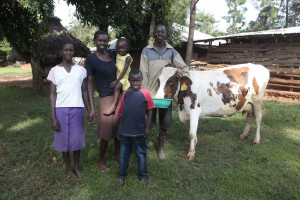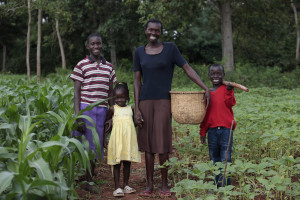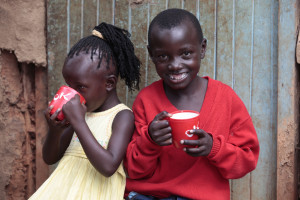 Faith Onyango lives with her husband, Sam, and their children in Ulafu village in Western Kenya. When they married in 2000, they couldn’t afford to buy a house so his father helped them build a small hut with a grass roof and mud walls, which they lived in from 2001 to 2009. “We were seen as such poor people,” Faith said.
Faith Onyango lives with her husband, Sam, and their children in Ulafu village in Western Kenya. When they married in 2000, they couldn’t afford to buy a house so his father helped them build a small hut with a grass roof and mud walls, which they lived in from 2001 to 2009. “We were seen as such poor people,” Faith said.
Faith is caring for a large family at a young age. They have four children – Reagan, 8, Ronny, 6, Sandra, 3, and Pamela, 1, and care for Judith, 13, who was orphaned when her parents died suddenly in 2010. Fortunately, Faith joined the Osiepe Women’s Group in 2006 and later received a heifer that she named Bahati, which means lucky in Kiswahili.
 Faith, Sam, Judith, Ronny and Sandra pose with Bahati, the family cow.
Faith, Sam, Judith, Ronny and Sandra pose with Bahati, the family cow.Before she joined the women’s group, a typical meal for this family consisted of mix greens and ugali (stiff corn meal porridge). Meat was expensive and they were lucky if they could eat it once a month. Sam had to search for jobs far from home to make enough income for their family, and he would go long periods without seeing them.
Now, Sam works at home farming. He credits Heifer for the manure and the training. “Heifer taught me how to do the nine maize holes,” Sam said. This technique for planting corn requires the farmer to plant nine corn seeds in a cluster a couple of inches below the ground using a mixture of soil and manure to better capture water and help the plants grow. This allows farmers to add more fertilizer as the plants grow. “He is now self-employed,” Faith said. “He is very happy.”
Improving their crop production has not only improved their diet, but has increased their income. Before joining the project, they would sell their kale, tomatoes, chili peppers and sugar cane for roughly $2.40 per week. Now they earn $24-$36 per week.
 Faith, Judith, Ronny and Sandra work in the cassava fields.
Faith, Judith, Ronny and Sandra work in the cassava fields.They also sell extra milk for an additional $71-$83 per week. Bahati produces an average of five and a half gallons of milk a day. The family consumes between a half-gallon and a gallon of milk and sells the remaining. “We call our milk ‘the salary’,” Sam said. Faith sees that her children are now stronger with this steady supply of milk. She remembers when Ronny contracted the measles. The doctor prescribed milk and eggs three times a day to help him eat and gain back the weight he had lost. Without Bahati, it would have been impossible for him to drink enough milk.
Now, Faith and Sam send their children to a private school where she feels they are encouraged and motivated more. They have also built a new house, bought additional animals for their farm and took a family vacation to Kisumu for an agricultural festival. They enjoyed seeing farmers and livestock from across East Africa. Faith and Sam invested most of their income into their farm, buying improved breeds of chickens and pigs, animal feed and a motorcycle to transport their milk, eggs and produce to the market.
They are actively Passing on the Gift® of knowledge and animals. Faith passed on Bahati’s first calf to her neighbor Lillian Oyuga. “Because someone brought the idea of passing on, now I have benefited and more families will benefit from passing on,” she said. Sam is passing on the knowledge and training he received to other farmers in his community. Sam began to train so many farmers that he decided to go school to get his certificate in adult education.
 Now Ronny and Sandra have enough milk to drink so they can grow up healthy.
Now Ronny and Sandra have enough milk to drink so they can grow up healthy.Faith equates nutrition with health and income with self-reliance. She and Sam are proud of what they’ve accomplished by joining this project. They can now meet their family’s needs and help others. “Heifer is doing wonderful work,” Sam said.